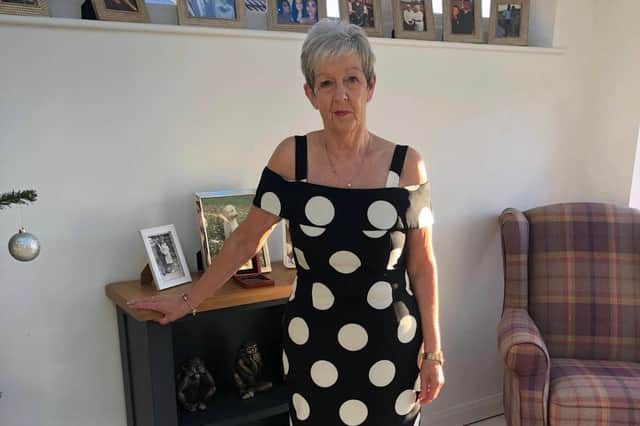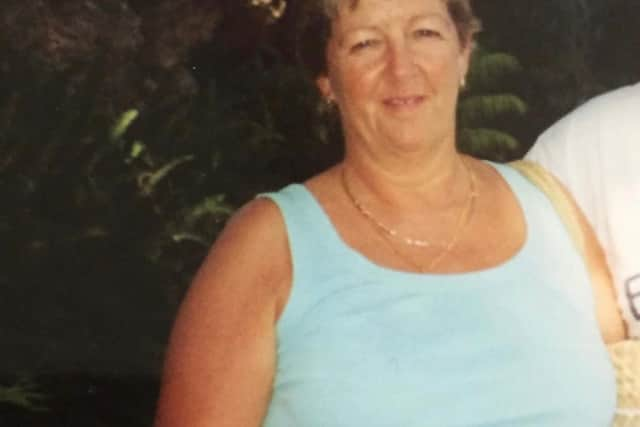New study shows expert support brings weight loss success like Janet's


Janet Pountney says she doesn't think twice now about going into a café alone - and has even joined a walking group.
Her success comes after a study by the University of Lincoln revealed expert group support helps people to lose more weight and can increase their mental toughness compared to those who go it alone
Advertisement
Hide AdAdvertisement
Hide AdJanet was a size 22 when she joined Slimming World - and says she is glad she did as she lost 6lb in week one.


Now following a healthy eating plan, her favourite foods are salmon, potatoes or rice, and seabass.
"At Slimming World, she loves the fact no-one ever judges, you are never alone and there are recipe ideas, fun and laughter," said the group's Sarah Scott.
"Janet did stop going and put some weight back on and now has realised being in group is what she needs to lose the weight and keep it off for life.
Advertisement
Hide AdAdvertisement
Hide Ad"She loves that you set your own target and she has met some fab people her consultant Jo has been incredible with support and has such a big caring heart.
"Being at group you realise we are all in the same boat."
The study by the University of Lincoln examined the relationship between weight loss and mental toughness over a period of six months.
During the six months of the study, on average Slimming World members lost over 2st more than those in a comparison group.
Their measures of mental toughness on average rose 10%, from a low to an average score in Slimming World group members, whereas the comparison group had no statistically significant change to their mental
toughness.
Advertisement
Hide AdAdvertisement
Hide AdThe findings of the study, which was led by Dr Elizabeth Stamp, a lecturer at Loughborough University, come at a time when the UK population faces a spiralling obesity crisis and increased mental health challenges.
Government figures suggest more than 40% of adults in England gained weight during the pandemic, with the average gain being half a stone (just over 4.1kg). More than half of adults (60%) and over two thirds of young people (68%) said their mental health got worse during lockdown.
Mental toughness, a concept used in psychology and behaviour change that has been studied within the sports field for many years, is linked to characteristics such as keeping a clear focus on goals even when under pressure, having a strong sense of purpose and self-determination, and feeling in control.
While it’s linked to resilience, it’s about more than being resilient, with sport psychologists noting mental toughness is what gives an elite athlete an edge. This is the first time the concept has been investigated in relation to weight loss.
Advertisement
Hide AdAdvertisement
Hide AdDr Elizabeth Stamp, who studied the role of mental toughness on health-related lifestyle behaviour change when completing her PhD at the University of Lincoln, says: “Mental toughness is about how someone copes with the challenges and stressors they face.
"More than that though, it is about seeking out and taking on new challenges. People who have a high mental toughness have skills like being able to break bigger goals into smaller achievable goals, being in control of their life and the decisions that they make and having the confidence to seek help when needed.
"These are abilities that people who have a lower mental toughness can develop, and mental toughness has been reported to benefit individuals in other aspects of their life, such as achieving social and educational goals.
“The study revealed that Slimming World members participating in the study lost on average 2st 5lbs over the six months and on average also increased their mental toughness.”
Advertisement
Hide AdAdvertisement
Hide AdProfessor Peter Clough, Technical Director at AQR International, developed the 4Cs model of mental toughness: challenge, commitment, confidence and control.
Dr Elizabeth Stamp says: “Looking at the 4Cs model it’s understandable that Slimming World members showed an increase in mental toughness scores.
"The multi-level support to make lifestyle changes which the group provides is specifically designed to help members increase their commitment to their weight loss and the changes needed to ensure they
achieve them.
"It supports them to feel in control of their choices and behaviours and feel more confident in their ability to make the changes even in situations where their commitment and motivation would otherwise be challenged (for example eating out, travelling, staying away from home, socialising etc).
Advertisement
Hide AdAdvertisement
Hide Ad"Helping members think about the challenges, make plans for when things may get in the way and develop strategies for these times, are all ways in which the group supports members to stick to their plans and
successfully lose weight each week.”
Dr Jacquie Lavin, Head of Research and Scientific Affairs, says: “This research shows the depth of understanding about the psychology of weight loss we have at Slimming World.
"By encouraging our members to try new foods, transform old, unhealthy habits and change their perception of food and activity, we create an environment for our members to challenge themselves on their own
timescales.
“The mental toughness findings are supported by member data from Slimming World groups which reveals that as members progress on their weight loss journey, they feel more sociable, happier, calmer and more peaceful, and feel they have more energy.
Advertisement
Hide AdAdvertisement
Hide Ad"They are less likely to say they feel downhearted, stressed, or anxious compared to non-members from the
general population.
"Members’ emotional wellbeing improved over their time at Slimming World and even remained higher during the COVID lockdown, when virtual groups were introduced for members, than when they first joined. They also had
higher emotional wellbeing scores than non-members.”